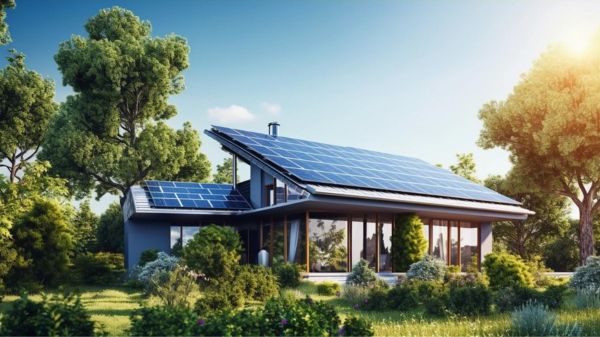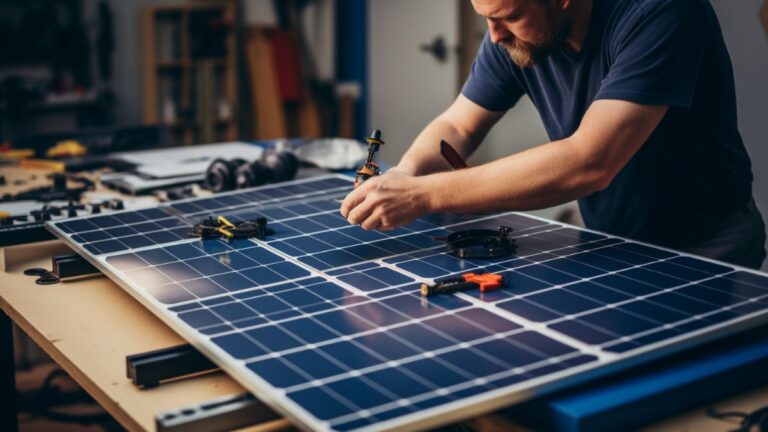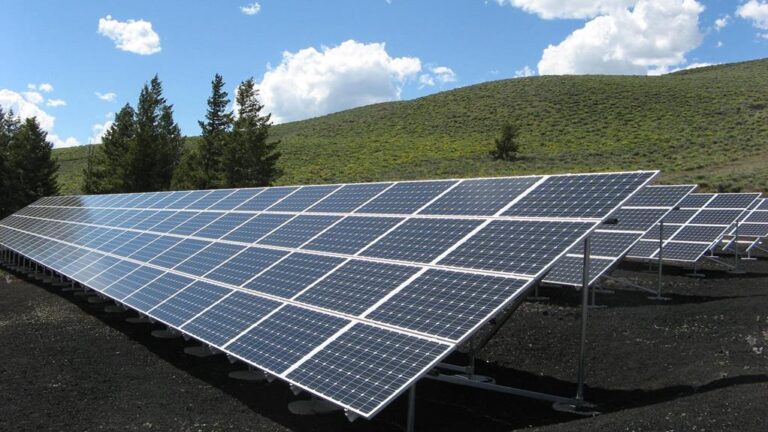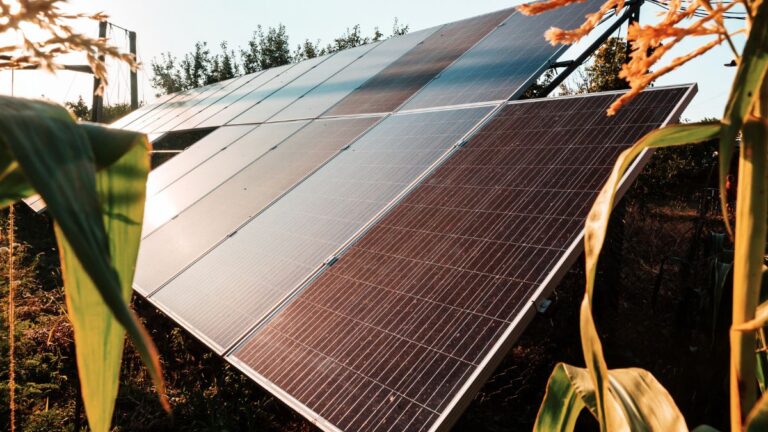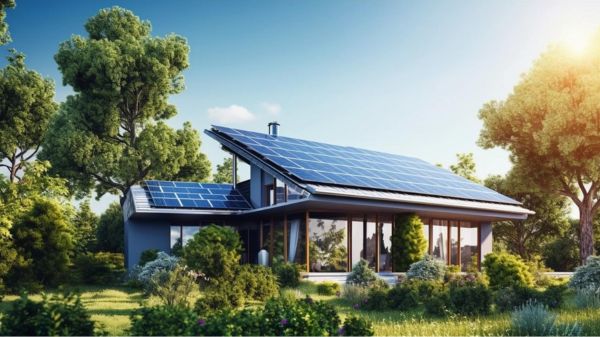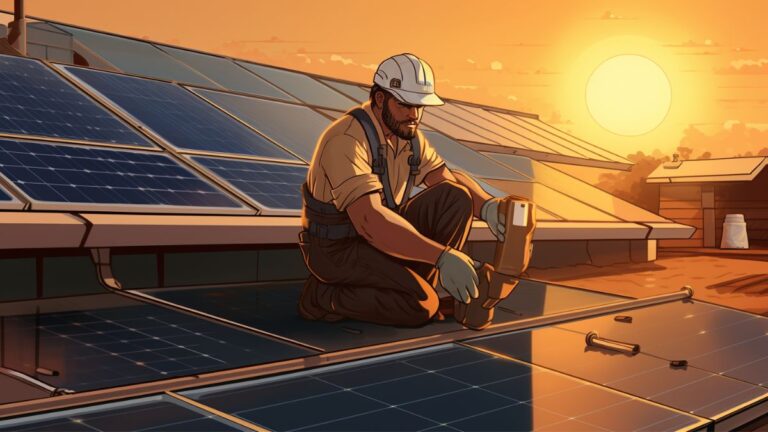13 Tips: Harnessing Solar Power for Sustainable Living
Welcome to our guide on harnessing solar power for sustainable living! In this article, we will provide you with 13 practical tips to help you make the most of this incredible renewable energy source.
By embracing solar power, we can reduce our carbon footprint, save on energy costs, and achieve energy independence.
Join us as we explore the benefits of solar energy and discover how it can bring us closer to a more sustainable and environmentally-friendly future.
The Environmental Impact
While harnessing solar power for sustainable living, it’s important to consider the environmental impact it has on our planet.
One of the key advantages of solar power is its high energy efficiency. Solar panels convert sunlight into electricity with minimal losses, making it a clean and efficient source of energy. This reduces our reliance on fossil fuels and decreases greenhouse gas emissions, contributing to sustainable development.
Additionally, solar power systems require minimal maintenance and have a long lifespan, which further reduces their environmental impact.
Energy Cost Savings
Harnessing solar power for sustainable living allows us to save on energy costs. One of the main benefits of solar power is its energy efficiency. Solar panels convert sunlight into electricity, reducing our reliance on traditional energy sources and lowering our utility bills.
By installing solar panels on our homes or businesses, we can generate our own electricity and potentially even sell excess power back to the grid, further reducing costs. In addition to the financial savings, solar panel installation also contributes to a greener environment by reducing carbon emissions.
Investing in solar power not only helps us save money, but also aligns with our desire for belonging to a community committed to sustainable living and protecting the planet for future generations.
Off-Grid Living
When it comes to off-grid living, one of the main considerations is the comparison between solar power and the traditional grid system.
With solar power, we’ve the opportunity to become energy self-sufficient, relying solely on renewable energy sources. This not only reduces our carbon footprint, but also provides us with greater control over our energy consumption and costs.
Solar Vs. Grid
We frequently rely on solar power instead of the grid for off-grid living. When it comes to choosing between solar and the traditional grid system, there are several factors to consider.
The solar installation process involves installing solar panels on your property, which convert sunlight into electricity. This allows you to generate your own power and become more self-sufficient.
One of the key benefits of solar power is its energy efficiency. Solar panels can convert sunlight into electricity with a high level of efficiency, reducing your reliance on fossil fuels and decreasing your carbon footprint.
Additionally, solar power is a renewable energy source, meaning it’s sustainable and won’t run out. By harnessing solar power for off-grid living, you can enjoy the advantages of energy efficiency while reducing your impact on the environment.
Energy Self-Sufficiency
By relying on solar power instead of the grid, we can achieve energy self-sufficiency for off-grid living. This means that we no longer have to depend on external sources for our energy needs.
Here are three reasons why energy self-sufficiency through solar power is advantageous:
- Resilience: Being off-grid allows us to be independent and resilient, especially during power outages or natural disasters. We’ve our own reliable source of energy that isn’t affected by external factors.
- Cost-effectiveness: Solar energy is a renewable technology that utilizes the sun’s energy to generate electricity. By harnessing this abundant resource, we can significantly reduce our electricity bills and save money in the long run.
- Environmental sustainability: Solar power is a clean and green energy source that produces zero emissions. By choosing to generate our energy through solar panels, we contribute to a healthier and more sustainable environment.
Embracing energy self-sufficiency through solar power brings us closer to a more sustainable and fulfilling way of living.
Renewable Energy Source
Solar power is a fantastic renewable energy source that can greatly reduce our carbon footprint. Renewable energy sources, such as solar power, are essential for sustainable living. They provide clean and unlimited energy that can be harnessed without depleting natural resources.
Installing solar panels is a practical way to tap into this renewable energy source. Solar panel installation involves placing photovoltaic panels on rooftops or in open spaces where they can capture sunlight and convert it into electricity. This process is relatively simple and can be done by professionals or even homeowners with basic DIY skills.
Reduced Carbon Footprint
Harnessing solar power significantly decreases our carbon footprint, making it a crucial step towards sustainable living. By reducing our reliance on fossil fuels and transitioning to renewable energy sources like solar power, we can greatly reduce emissions and mitigate the impacts of climate change.
Here are three ways in which solar power helps in achieving reduced emissions and sustainable living:
- Clean Energy Generation: Solar panels convert sunlight into electricity without emitting greenhouse gases. This means that by using solar power, we can generate electricity without contributing to carbon dioxide emissions, one of the main drivers of climate change.
- Energy Independence: Solar power allows individuals and communities to generate their own electricity, reducing their reliance on fossil fuels. By embracing solar energy, we can become less dependent on non-renewable energy sources and contribute to a more sustainable future.
- Long-Term Environmental Impact: Solar power has a significantly lower environmental impact compared to traditional energy sources. It reduces air pollution, water pollution, and the depletion of natural resources, leading to a cleaner and healthier environment for future generations.
Reliable Power Supply
Transitioning to solar power ensures a consistent and dependable supply of electricity, empowering us to embrace sustainable living.
With reliable backup options and advancements in solar technology, we can now rely on solar power even during periods of low sunlight or unexpected power outages.
Battery storage systems, such as lithium-ion batteries, have made significant progress in recent years, offering efficient and long-lasting backup power.
These batteries are designed to store excess solar energy during the day and provide electricity when sunlight is limited or unavailable.
Additionally, solar technology advancements have improved the efficiency and performance of solar panels, allowing them to generate electricity even in low light conditions.
With these reliable backup solutions and technological advancements, solar power is now a dependable and sustainable energy source for our everyday needs.
Long-Term Investment
Investing in solar power for sustainable living is a prudent long-term decision that benefits us environmentally and economically. Here are three reasons why it’s important to consider solar power as a long-term investment:
- Long term financial stability: Solar power systems have a long lifespan, typically lasting 25 to 30 years. By investing in solar, you can reduce or eliminate your monthly electricity bills, providing long-term financial stability. Additionally, with the availability of government incentives and tax credits, the initial investment can be recouped over time.
- Long term energy security: Solar power provides a reliable and consistent source of energy. By harnessing the power of the sun, you can reduce your dependence on fossil fuels and the fluctuating prices of electricity. This ensures a stable and secure energy supply for years to come.
- Environmental benefits: Solar power is a clean and renewable energy source that produces zero greenhouse gas emissions. By investing in solar, you’re actively contributing to the reduction of carbon footprint and mitigating climate change. It’s a responsible choice that aligns with the values of sustainable living and belonging to a community that prioritizes the environment.
Government Incentives
When it comes to harnessing solar power for sustainable living, government incentives play a crucial role.
Homeowners can enjoy financial benefits through various programs, such as tax credits and rebates, which help offset the initial installation costs of solar panels.
Additionally, these incentives contribute to reducing the environmental impact by encouraging the adoption of renewable energy sources and decreasing reliance on fossil fuels.
Financial Benefits for Homeowners
To maximize the financial benefits of harnessing solar power, homeowners can take advantage of various government incentives. These incentives are designed to encourage the adoption of renewable energy and promote energy efficiency in homes. Here are three key benefits that homeowners can enjoy:
- Tax credits: Homeowners can receive federal tax credits for installing solar panels on their property. These credits can help offset the upfront costs of purchasing and installing the solar system, providing a significant return on investment over time.
- Net metering: Many states offer net metering programs, which allow homeowners to sell excess solar energy back to the grid. This means that homeowners can earn credits on their electricity bills for the surplus energy they produce, further reducing their overall energy costs.
- Rebates and grants: Some local governments and utility companies provide rebates and grants to homeowners who invest in solar energy systems. These financial incentives can help lower the initial investment and shorten the payback period, making solar power more accessible and affordable for homeowners.
Environmental Impact and Benefits
We can continue by exploring the environmental impact and benefits of government incentives in harnessing solar power for sustainable living.
When it comes to energy efficiency, solar panel technology advancements have played a crucial role. The development of more efficient solar panels has significantly increased the amount of electricity that can be generated from the same amount of sunlight. This means that fewer solar panels are needed to produce the same amount of energy, resulting in less land required for installation.
Moreover, government incentives such as tax credits, grants, and rebates have made solar power more affordable and accessible to homeowners. These incentives not only promote the adoption of renewable energy sources but also help reduce greenhouse gas emissions, air pollution, and reliance on fossil fuels.
Increased Property Value
Our experience has shown that harnessing solar power can lead to an increase in property value. Installing solar panels on your home can have a positive impact on your home appraisal, making it more attractive to potential buyers.
Here are three reasons why solar power can boost your property value:
- Energy Efficiency Benefits: Solar panels generate clean, renewable energy, reducing the reliance on traditional power sources. This not only lowers utility bills but also demonstrates your commitment to sustainability, which is highly valued by eco-conscious buyers.
- Long-term Cost Savings: By harnessing solar power, homeowners can significantly reduce their electricity expenses. This long-term cost savings is an appealing factor for potential buyers, as it allows them to enjoy lower energy bills in the future.
- Environmental Responsibility: Solar energy is a clean and sustainable alternative to fossil fuels. By investing in solar power, homeowners contribute to the reduction of greenhouse gas emissions and combat climate change. This environmental responsibility resonates with buyers who prioritize green living and want to make a positive impact on the planet.
Energy Independence
Harnessing solar power provides homeowners with the opportunity to achieve energy independence.
One key aspect of achieving energy independence is through the use of energy storage systems. These systems allow homeowners to store excess solar energy generated during the day for use during the night or cloudy days. By investing in efficient energy storage solutions, homeowners can ensure a continuous and reliable supply of electricity, even when the sun isn’t shining.
Another important factor to consider is solar panel efficiency. High-efficiency solar panels can convert a larger percentage of sunlight into electricity, maximizing the amount of energy generated. This not only increases the overall energy production but also reduces the number of solar panels required, making it a cost-effective solution for homeowners seeking energy independence.
Low Maintenance Requirements
To ensure a hassle-free experience, solar power systems have low maintenance requirements. Here are three reasons why minimal upkeep and easy installation make solar power an attractive option for sustainable living:
- Time-saving: Solar power systems require minimal maintenance, allowing homeowners to save time and focus on other aspects of their lives. With regular cleaning of the solar panels and occasional inspections, solar power systems can operate efficiently for years without the need for extensive maintenance.
- Cost-effective: Low maintenance requirements translate into cost savings for homeowners. By minimizing the need for repairs and replacements, solar power systems reduce the overall expenses associated with traditional energy sources. Additionally, easy installation means homeowners can avoid costly professional assistance, further contributing to cost-effectiveness.
- Peace of mind: With low maintenance requirements, homeowners can enjoy peace of mind knowing that their solar power system will continue to generate clean and renewable energy without significant intervention. This reliability fosters a sense of belonging to a sustainable community and contributes to a more sustainable future for all.
Job Creation in the Solar Industry
When it comes to harnessing solar power, there are abundant job opportunities in the solar industry. From solar panel installation to maintenance and repair, there’s a wide range of roles available for individuals interested in renewable energy.
Not only does the solar industry provide employment opportunities, but it also has a significant economic impact, contributing to local economies and creating a sustainable future for communities.
Solar Job Opportunities
As we explore the world of solar power for sustainable living, it becomes evident that there are numerous job opportunities available in the solar industry. The solar industry is experiencing significant growth, and with this growth comes a demand for skilled professionals.
Here are three exciting career opportunities in the solar industry:
- Solar Panel Installer: As a solar panel installer, you’ll be responsible for assembling and installing solar panels on rooftops, ensuring they’re positioned correctly for maximum solar exposure. This hands-on role requires practical skills and attention to detail.
- Solar System Designer: In this role, you’ll use your technical expertise to design efficient solar systems for residential and commercial buildings. You’ll analyze energy consumption patterns and create customized solutions to meet the specific needs of each client.
- Solar Sales Representative: As a solar sales representative, you’ll educate potential customers about the benefits of solar energy and help them make informed decisions. This role requires excellent communication and sales skills, as well as a passion for sustainable living.
These career opportunities in the solar industry offer a chance to contribute to a greener future while also enjoying a fulfilling and financially rewarding career.
Economic Impact of Solar
The economic impact of solar power is evident in the job creation within the solar industry. As solar energy continues to gain popularity and recognition as a sustainable and clean source of power, it has led to significant economic growth and the creation of numerous job opportunities.
The solar industry has witnessed a surge in employment, with a wide range of roles available, including solar panel installers, engineers, project managers, and sales representatives. These jobs not only contribute to the expansion of the industry but also provide individuals with stable and fulfilling career options.
Moreover, the economic benefits extend beyond job creation, as the solar industry stimulates local economies, attracts investments, and fosters innovation. By embracing solar power, communities can’t only make a positive impact on the environment but also experience the economic advantages that come with it.
Community Engagement Opportunities
We can actively participate in our community by exploring various opportunities to engage in harnessing solar power for sustainable living. Community outreach is an essential aspect of promoting solar technology advancements and encouraging widespread adoption.
Here are three ways we can engage with our community:
- Organize solar workshops and educational events: By hosting workshops, we can educate our community members about the benefits of solar power and provide them with practical knowledge on installation, maintenance, and financing options. This not only empowers individuals to make informed decisions but also fosters a sense of community belonging and collaboration.
- Collaborate with local businesses and organizations: Partnering with local businesses and organizations can create opportunities for collective action in harnessing solar power. By working together, we can leverage resources, share expertise, and implement larger-scale solar projects that benefit the entire community.
- Support solar cooperatives and community solar programs: Joining or supporting solar cooperatives and community solar programs allows individuals to pool their resources and invest in shared solar installations. This enables community members who may not have suitable rooftops or financial means to still benefit from solar energy, fostering inclusivity and a sense of shared responsibility.
Summary
Harnessing solar power is a game-changer for sustainable living. By reducing our carbon footprint and achieving energy independence, we not only contribute to a greener future but also save on energy costs.
The low maintenance requirements and job creation opportunities in the solar industry make it a practical choice for communities.
Let’s embrace this renewable energy source and engage in a collective effort to create a brighter and more sustainable world. Together, we can power the future.
